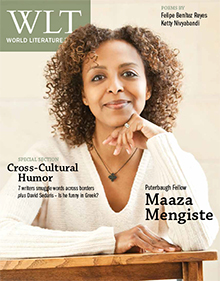The Assassin from Apricot City: Reportage from Turkey by Witold Szabłowski
Antonia Lloyd-Jones, tr. London. Stork Press. 2013. ISBN 9780957391253
 Witold Szabłowski is a Polish journalist who has written extensively about Turkey. Twelve pieces of nonfiction have been arranged into his newly translated book, The Assassin from Apricot City. Each story can stand alone, but Szabłowski weaves them loosely into a larger work of art. History repeats itself, characters are reincarnated from one story to another, and problems like misogyny and exile are perpetual curses.
Witold Szabłowski is a Polish journalist who has written extensively about Turkey. Twelve pieces of nonfiction have been arranged into his newly translated book, The Assassin from Apricot City. Each story can stand alone, but Szabłowski weaves them loosely into a larger work of art. History repeats itself, characters are reincarnated from one story to another, and problems like misogyny and exile are perpetual curses.
The title story concerns Ali Ağca, a right-wing terrorist from Malatya where the summer is “green and orange, with the scent and flavor of apricots.” In 1981 Ağca traveled to the Vatican and put four bullets into the pope. John Paul II miraculously survived, forgave his would-be assassin, and even visited him in prison. Ağca grew to love the pope like a father and, in what may have been a move to outfox prosecutors, proclaimed himself the messiah. The story parallels an earlier piece on Sabbatai Zevi, a seventeenth-century Smyrna rabbi who also claimed to be the messiah. After gaining thousands of followers from the Jewish community, Sabbatai was interrogated in the sultan’s court. He promptly converted to Islam, spurring some adherents to follow suit and starting a crypto-Jewish subculture in the Ottoman Empire that feeds paranoia to this day.
In the opener, Szabłowski takes us to Turkey’s Aegean coast. Here we meet smugglers and their human cargo—African and Middle Eastern migrants preparing for dangerous boat rides to Greece, “watching the weather channel so intently that it looks as if you could improve it simply by staring.” Near the end of the book, communist poet Nâzim Hikmet is forced to flee Turkey for Europe in 1951, his wife, Münevver, following some years later. They sneak out on boats, from ports frequented by today’s undocumented immigrants.
Szabłowski’s Turkey is a land of paradoxes: Kurds who praise family values but kill their daughters and sisters if they’re raped, artists who loath the West but crave its approval, love-struck young men who long to sleep with their girlfriends but know this would make the women unmarriageable. According to one Libyan migrant, in Turkey “you’ll find the sort of people who’ll share their last crust of bread with you, as well as the sort who’ll cut out your kidneys and dump you in the canal.”
Sometimes Szabłowski makes awkward generalizations. Too many sentences start with phrases like “Turkish boys are obsessed with . . .” or “That’s how the Turks behave whenever . . .” These statements feel lazy and run contrary to his theme of human complexity. But when he tells poignant stories about tangible men and women, a broader picture begins to emerge—baffling as the image may be.
Jacob Daniels
New York City



























